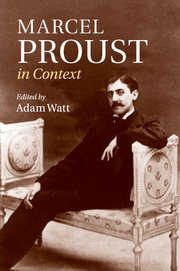Book contents
- Frontmatter
- Contents
- List of Illustrations
- Notes on contributors
- Figure I. Marcel Proust, portrait in oils by Jacques-Émile Blanche, 1892
- Preface
- Figure 2. Proust photographed on his death-bed by Man Ray, 1922
- Note on the text
- Chronology
- Part I Life and works
- Part II Historical and cultural contexts
- i. The arts
- ii. Self and society
- Chapter 14 Freud and psychoanalysis
- Chapter 15 Sexuality
- Chapter 16 Health and medicine
- Chapter 17 Technology and science
- Chapter 18 Religion
- Chapter 19 Travel
- Chapter 20 Journalism
- Chapter 21 Politics and class
- Chapter 22 The Dreyfus Affair
- Chapter 23 The First World War
- Part III Critical reception
- Further reading
- Index
- References
Chapter 17 - Technology and science
from ii. - Self and society
Published online by Cambridge University Press: 05 November 2013
- Frontmatter
- Contents
- List of Illustrations
- Notes on contributors
- Figure I. Marcel Proust, portrait in oils by Jacques-Émile Blanche, 1892
- Preface
- Figure 2. Proust photographed on his death-bed by Man Ray, 1922
- Note on the text
- Chronology
- Part I Life and works
- Part II Historical and cultural contexts
- i. The arts
- ii. Self and society
- Chapter 14 Freud and psychoanalysis
- Chapter 15 Sexuality
- Chapter 16 Health and medicine
- Chapter 17 Technology and science
- Chapter 18 Religion
- Chapter 19 Travel
- Chapter 20 Journalism
- Chapter 21 Politics and class
- Chapter 22 The Dreyfus Affair
- Chapter 23 The First World War
- Part III Critical reception
- Further reading
- Index
- References
Summary
Few authors foreground the arts quite so comprehensively as Proust; certainly, none made them so central to their own literary production. Proust's whole life was saturated with love of the arts, and so too was to be his great novel: probably no other work of literature celebrates the arts as totally as his, or is so convincing in this pursuit.
Thus Richard Bales hails Proust as champion of the arts. Yet it is no doubt for this very reason that the scientific bent of the author has tended to be overlooked. Nevertheless in recent years there has been a reassessment of the ‘supposed Proustian preference [for] art to science’. Contemporary writers were indeed aware of Proust's ‘double vision’ as this assessment by Virginia Woolf makes clear:
The mind of Proust lies open with the sympathy of a poet and the detachment of a scientist . . . It is as though there were two faces to every situation; one full in the light so that it can be described as accurately and examined as minutely as possible; the other half in shadow so that it can be described only in a moment of faith and vision by the use of metaphor.
Science and the arts belong to different paradigms. Is there both a scientific and a poetic Proust as Woolf suggests? What evidence of crossover emerges between the arts and the sciences in Proust? The modernist period in which Proust was writing is characterized by rapid technological advance, including notably the introduction of electricity, telephony, radiography, photography and the motor car. ‘To be sure’, remarks Sara Danius, ‘most scholars and critics agree that avant-garde movements such as cubism, futurism, surrealism, and vorticism must be understood in relation to technology.’ Nevertheless she sees that traditional accounts of modernism have been marked ‘by an antitechnological bias’.
- Type
- Chapter
- Information
- Marcel Proust in Context , pp. 130 - 136Publisher: Cambridge University PressPrint publication year: 2013



